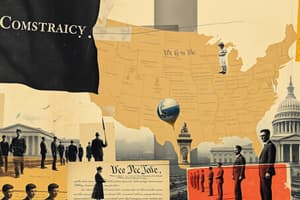Podcast
Questions and Answers
What defines a key characteristic of a democracy?
What defines a key characteristic of a democracy?
- Use of authoritarian policies
- Efficiency in decision making
- Centralized governance
- Promotion of individual freedoms (correct)
Which principle is most fundamentally associated with a democratic form of governance?
Which principle is most fundamentally associated with a democratic form of governance?
- Absolute monarchy
- Decentralized authority
- Separation of powers (correct)
- Judicial supremacy
In the context of a democratic society, which concept best embodies the idea of equal participation in governance?
In the context of a democratic society, which concept best embodies the idea of equal participation in governance?
- Civic engagement (correct)
- Oligarchy
- Meritocracy
- Political apathy
What is a significant challenge faced by democracies in contemporary society?
What is a significant challenge faced by democracies in contemporary society?
Which of the following best describes the relationship between democracy and civil liberties?
Which of the following best describes the relationship between democracy and civil liberties?
Flashcards
US Democracy
US Democracy
A system of government where citizens have the power to choose their leaders and make decisions about how their country is run.
Citizen power
Citizen power
The right and ability of citizens to participate in the democratic process.
Leader election
Leader election
A process where citizens vote to choose the people who will lead their country
Decision-making process
Decision-making process
Signup and view all the flashcards
Key concepts
Key concepts
Signup and view all the flashcards
Study Notes
Definitions of US Democracy
- US democracy is a system of government based on the principles of popular sovereignty, majority rule with minority rights, and the protection of individual liberties.
- It is characterized by representative institutions, competitive elections, and the rule of law.
- The concept of popular sovereignty emphasizes the idea that ultimate political authority resides in the people, who elect representatives to make decisions on their behalf.
- Majority rule with minority rights acknowledges the importance of respecting the rights of all citizens, even those who are not part of the winning majority.
- The protection of individual liberties encompasses a wide range of fundamental rights, including freedom of speech, religion, press, assembly, and the right to due process and equal protection under the law.
Key Concepts in US Democracy
- Separation of powers: The US Constitution divides governmental power among three distinct branches: legislative, executive, and judicial. Each branch has specific responsibilities and powers, which limit the potential for any one branch to become too powerful.
- Checks and balances: The separation of powers is complemented by a system of checks and balances. Each branch of government has the power to limit the actions of the other two branches, ensuring a balance of power. For instance, the legislative branch can impeach and remove the president, the executive branch can veto legislation, and the judicial branch can declare laws unconstitutional.
- Federalism: The US system of government is a federation, meaning that power is divided between a national government and state governments. This division of powers is outlined in the Constitution and often results in debates about the balance of power between the two levels of government.
- Rule of law: Everyone, including government officials, is subject to and accountable under the law. The rule of law is essential for ensuring fairness and preventing abuse of power.
- Individual rights: American democracy values individual rights and freedoms. The Bill of Rights guarantees specific protections from government interference, such as freedom of speech, religion, and the press. These freedoms are essential aspects of a functioning democracy and allow for widespread participation.
- Political participation: Active participation in the political process is seen as crucial to a healthy democracy. Forms of political participation include voting, running for office, protesting, contacting elected officials, and supporting various civic organizations.
- Civil society: Organizations that operate independently of the government can play a critical role in a healthy democracy. These organizations, such as advocacy groups, think tanks, unions, and community groups, provide platforms for citizen voices and can act as intermediaries between citizens and government.
- Free and fair elections: Regular, free, and fair elections are essential elements of the American democratic system. These elections allow citizens to choose their representatives and hold elected officials accountable.
Challenges to US Democracy
- Political polarization: Increasingly divided political viewpoints can lead to gridlock, making compromise difficult and hindering the legislative process.
- Voter suppression efforts: Measures aiming to limit voter access can reduce participation in elections, potentially undermining democratic principles and fairness.
- Disinformation and misinformation: The spread of false or misleading information through various channels can have a significant impact on public opinion and decision-making, jeopardizing trust in the system.
- Economic inequality: Significant disparities in wealth and income can create inequalities in political influence and representation, potentially undermining the notion of equal rights and opportunity.
- Political corruption: The abuse of power or influence for personal gain can damage public trust in the political system and weaken democratic institutions.
Evolution of US Democracy
- US democracy has evolved over time, with ongoing debates and challenges to its principles.
- Amendments to the Constitution have added and clarified rights, reflecting changing societal values.
- Civil rights movements have worked to expand democratic ideals and participation for marginalized groups.
Studying That Suits You
Use AI to generate personalized quizzes and flashcards to suit your learning preferences.




